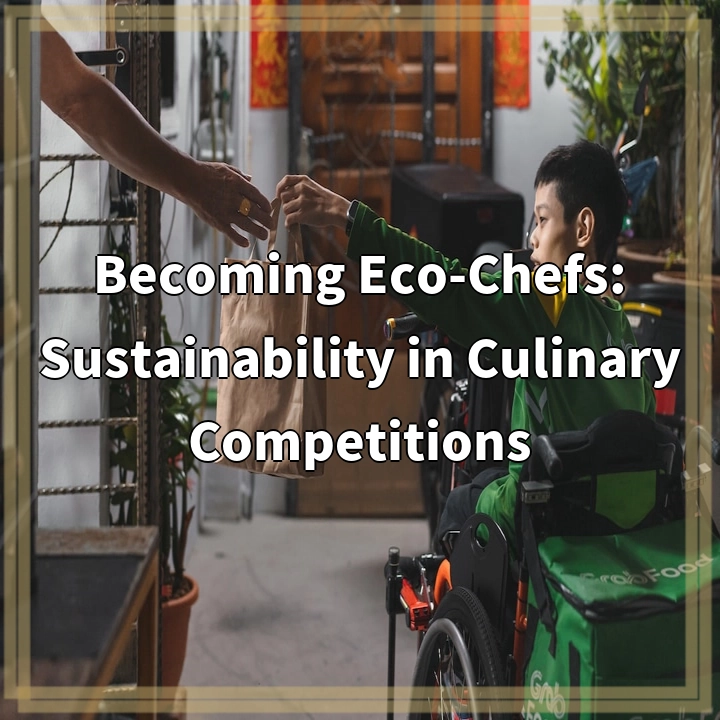
What is “Becoming Eco-Chefs: Sustainability in Culinary Competitions”
In recent years, there has been a growing movement among culinary competitions to promote sustainability and environmental consciousness. “Becoming Eco-Chefs” refers to the emerging trend of chefs and culinary professionals incorporating eco-friendly practices and strategies into their competition routines. These competitions challenge chefs to showcase their creativity, skill, and ability to deliver exceptional dishes while minimizing their environmental impact.
Real-World Problems
While the concept of sustainability in culinary competitions is laudable, there are several real-world challenges that need to be addressed. These problems span across various aspects of the competitions and require careful consideration and action to achieve a truly sustainable culinary industry.
Ingredient Sourcing
One major hurdle faced by eco-chefs is sourcing environmentally friendly ingredients. The availability of sustainably sourced ingredients can be limited, leading to the use of conventional ingredients that may have negative environmental and social repercussions. Additionally, ensuring the traceability and authenticity of sustainable ingredients poses another set of challenges for chefs.
Waste Management
Food waste is a significant issue in culinary competitions. With time constraints and the pressure to create exceptional dishes, chefs often generate a considerable amount of food waste. Proper management of this waste, including recycling, composting, and minimizing single-use packaging, becomes crucial for achieving sustainability goals. Finding efficient and practical solutions to reduce waste is a constant challenge for eco-chefs.
Eco-Friendly Kitchen Equipment
Culinary competitions often require the use of specialized equipment and appliances. However, the energy consumption and environmental impact of such equipment can be significant. The availability of eco-friendly alternatives, which are both functional and sustainable, remains limited. Eco-chefs face the challenge of finding and using greener kitchen equipment without compromising on their performance.
Judging Criteria and Awareness
To encourage and recognize sustainability efforts in culinary competitions, it is essential to align judging criteria with eco-friendly practices. However, many competitions still prioritize aesthetics, taste, and traditional culinary techniques over environmental considerations. Raising awareness among judges, competitors, and the culinary industry as a whole about the importance of sustainability is crucial to drive change in this field.
Scaling up Sustainable Practices
While some culinary competitions and individual chefs are actively integrating sustainable practices, achieving widespread adoption of these practices remains a challenge. Scaling up sustainable practices requires education, training, and infrastructure support within the culinary industry. Collaboration among chefs, organizers, suppliers, and sponsors is necessary to create an environment where sustainable strategies are the norm rather than the exception.

Solutions for “Becoming Eco-Chefs: Sustainability in Culinary Competitions”
Addressing the real-world problems associated with sustainability in culinary competitions requires proactive solutions and collaborative efforts. Here are some potential solutions to promote eco-friendly practices within the industry:
1. Promote Local and Seasonal Ingredient Sourcing
Encouraging chefs to source ingredients locally and seasonally can help reduce the environmental impact associated with long-distance transportation and excessive resource consumption. Building relationships with local farmers and suppliers can ensure a steady supply of sustainable ingredients for culinary competitions.
2. Implement Effective Waste Management Strategies
Establishing waste management protocols that prioritize recycling, composting, and the reduction of single-use packaging is vital. Providing chefs with easy access to recycling and composting facilities during competitions can minimize food waste and encourage responsible disposal practices.
3. Advocate for Energy-Efficient Kitchen Equipment
Culinary competitions and equipment manufacturers should collaborate to explore and promote energy-efficient alternatives. By choosing eco-friendly kitchen equipment, chefs can significantly reduce their carbon footprint without compromising the quality of their dishes.
4. Encourage Judging Criteria that Reflect Sustainability
Competition organizers, judges, and culinary associations should update judging criteria to include sustainability considerations. Recognizing and rewarding chefs who prioritize eco-friendly practices will drive more participants to adopt sustainable strategies and shift the entire competition landscape.
5. Provide Education and Training on Sustainable Practices
Education plays a crucial role in driving change. Offering training programs, workshops, and seminars on sustainable culinary practices can empower chefs with the knowledge and skills necessary to incorporate eco-friendly strategies into their competition routines. Collaboration with culinary schools and industry experts can enhance the effectiveness of these educational initiatives.
6. Foster Collaboration and Networking
Creating platforms for chefs, competition organizers, suppliers, and sponsors to come together can facilitate knowledge-sharing, idea generation, and collaboration. By working together, stakeholders can collectively promote and support sustainable practices, creating a ripple effect throughout the culinary industry.















